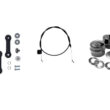Buying a car? Don’t make a decision without considering these top 3 factors:
Don’t forget: Resale value and maintenance costs are also important factors to consider. But by keeping these top 3 factors in mind, you’ll be well on your way to making an informed decision when buying a car.
What are the 3 Main Things to Consider When Buying a Car?
As a car blogger with experience in the automotive industry, I can tell you that there are a lot of factors to consider when purchasing a new car. However, there are three main things that you should always keep in mind: price, quality, and features.
Price: The Most Important Factor When Purchasing a New Car
Without a doubt, price is the most crucial factor to consider when buying a new car. Your budget will ultimately determine what kind of car you can afford, so it’s important to know what you’re willing to spend before you start shopping.
One key thing to keep in mind when considering price is that it’s not just about the sticker price of the car. You also need to think about the long-term costs of owning the car, such as gas, insurance, and maintenance. These costs can add up quickly, so it’s important to factor them into your budget.
When shopping for a car, don’t be afraid to negotiate the price with the dealer. You may be able to get a discount or special financing offer that can make the car more affordable. However, keep in mind that the dealer also needs to make a profit, so be reasonable with your offers.
Quality: What to Look for in a Brand New Car
Quality is another essential factor to consider when buying a new car. You want to make sure that you’re investing in a vehicle that will last you for many years to come, and that won’t require costly repairs down the line.
One way to assess the quality of a car is to look at its safety ratings. The National Highway Traffic Safety Administration (NHTSA) and the Insurance Institute for Highway Safety (IIHS) both conduct crash tests and rate cars based on their safety features. You can also look at customer reviews and ratings to get an idea of how reliable the car is.
When it comes to quality, it’s also important to consider the brand of the car. Some brands are known for their reliability and durability, while others may have a reputation for having more frequent maintenance issues.
Features: Understanding What Features are Essential
When it comes to features, it’s important to know what you’re looking for in a car. Some features may be essential for your lifestyle or driving needs, while others may just be nice-to-have.
Here are some features to consider:
- Safety features: Look for a car with features like airbags, anti-lock brakes, and a backup camera.
- Technology: Consider features like Bluetooth connectivity, a touchscreen display, and a navigation system.
- Comfort: Look for features like heated seats, a sunroof, and a premium sound system.
However, keep in mind that the more features a car has, the higher the price tag will likely be. Make sure to prioritize the features that are most important to you and your driving needs.
Resale Value: A Crucial Factor in Long-term Planning
While it may seem counterintuitive to think about resale value when you’re purchasing a new car, it’s actually an important factor to consider if you’re thinking about the long-term.
Cars depreciate in value over time, and some hold their value better than others. If you plan on selling or trading in your car in a few years, you want to make sure that you’re investing in a vehicle that will hold its value.
Some brands are known for their high resale value, while others may drop in value more quickly. Do your research before making a purchase to make sure that you’re getting the best value for your money in the long run.
Maintenance: Keeping Your Car Running Smoothly Beyond Purchase
Finally, it’s essential to consider maintenance when purchasing a new car. Regular maintenance can help keep your car running smoothly and prevent costly repairs down the line.
Be sure to read the owner’s manual and follow the manufacturer’s recommended maintenance schedule. This may include oil changes, tire rotations, and other routine maintenance tasks.
It’s also a good idea to find a trustworthy mechanic or dealership that can handle your maintenance needs. Don’t be afraid to ask around for recommendations or read online reviews to find a reputable service provider.
In conclusion, buying a new car can be a daunting process, but by considering the factors of price, quality, features, resale value, and maintenance, you can make an informed decision that meets your needs and budget.



